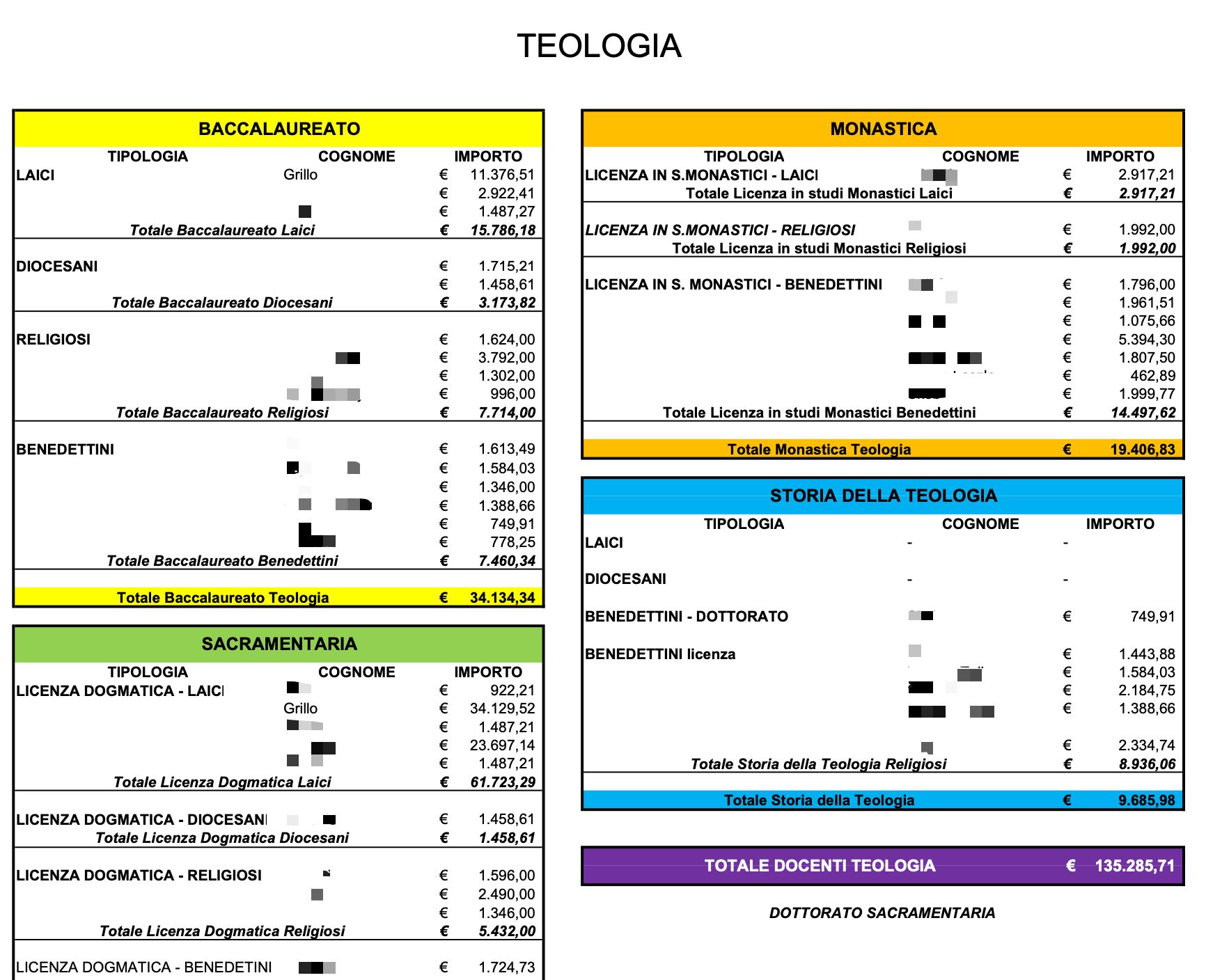🇮🇹 Versione italiana
Rome - As we have reported, in the heart of Rome, at the Pontifical Athenaeum of Sant’Anselmo, several bishops have, for years now, chosen not to send their students there. A similar situation can be observed at the Abbey of Santa Giustina in Padua. Why such mistrust? Among the most controversial lecturers is Andrea Grillo, a layman known for hurling invectives from his Facebook account and for commenting—like a bitter boomer—on every ecclesial activity involving women and the laity. Most recently, he has launched yet another tirade, this time accusing “the hierarchy” of attempting, in his view, a coup. Needless to say, the loudmouth from Savona was nowhere to be seen in the Paul VI Hall.
In the name of “synodal logic”, Andrea Grillo misses no opportunity to insult and discredit anyone who dares to think differently from him. Even regarding his salary, he has accused this portal of spreading falsehoods—without ever providing a single document to disprove what has been published. Curious, isn’t it? We, on the other hand, speak with facts. And even if some become agitated when struck by the truths we report, today we make public one of the many documents in our possession concerning Andrea Grillo and the Pontifical Athenaeum of Sant’Anselmo. We shall see whether Grillo—always quick to cry “liar!” at those who disagree with him—will continue with his ridiculous performance. What many were unaware of, in fact, is that his chair is funded by significant financial contributions from the Swiss Benedictine Confederation—a religious entity with, evidently, very specific interests. But how can this be? Grillo even belongs to that select group of lecturers who receive higher remuneration based on the number of theses they supervise—something that does not apply to everyone, particularly not to clerics or religious. Yet the money provided by the Benedictines is no small matter: it represents the fruit of the labour and generosity of monasteries and Catholic faithful who expect such funds to be used to safeguard and transmit the Catholic faith—not to question it. So, how much money is being allocated to enable Grillo to attack everything and everyone? Recently, he lashed out at the Dicastery for the Doctrine of the Faith for the documents Gestis verbisque, Fiducia supplicans, and Dignitas infinita. “He even spoke in favour of the process underway in the Amazon concerning the liturgy. He was shameless enough to claim they contacted him to take part,” explains one of his colleagues. In short, Grillo attacks anyone who fails to include him. The Dicastery? Fine—Fernandez is better than Ladaria—but they didn’t involve him, so he shouts.

The reliability of his claims, then, is plain for all to see. Andrea Grillo’s positions on fundamental matters such as the priesthood, synodality, and the ordination of women are entirely incompatible with the Church’s Magisterium. His tone is also deeply offensive: he has, for instance, labelled as “psychiatric cases” all Catholics worldwide who maintain that women cannot be admitted to ordained ministry. Grillo continues to expound on these subjects—with no actual training—like so many frustrated laypeople who lash out at the hierarchy because it refuses to bend to their ambitions. But for the screamer, it’s all “false”. Always, and only, without evidence. Frustration is a dreadful thing. It was again Grillo, from Camaldoli, who ranted against these norms because he sees sacred ordination as a form of power. Such a distorted view of ministry truly sends shivers down one’s spine. Let us not forget the numerous insults he hurled at Benedict XVI and the Tridentine Mass—things which, had they been directed at Pope Francis, would have landed Grillo exactly where he belongs: in the vegetable garden.
As Saint John Paul II reminded us: “The faithful have the right to receive the word of God in its entirety and purity. The task of theology is to serve this right, helping the People of God to understand the faith ever more deeply” (Donum Veritatis, 7). When theology turns into a constant act of protest, it betrays its original purpose. It is worth recalling that those who teach at a pontifical institute do so mandato ecclesiae—not in the name of some intellectual autonomy detached from revealed truth. As the Congregation for the Doctrine of the Faith writes: “Public dissent from the Magisterium’s teaching cannot be considered a legitimate expression of theological freedom” (Donum Veritatis, 32). In Grillo’s case, what stands out is the paradox: a theologian enjoying a prestigious and well-paid position—thanks to funds from the Catholic Church—who for years has been promoting ideas that contradict, if not openly violate, the deposit of faith. One is left wondering: is it right that an ecclesial institution continues to fund academic posts held by those who are not in full communion with the Church’s Magisterium?
This is a serious question, and it demands an answer—particularly as there are more than a few complaints at Sant’Anselmo. As Pope Francis has also reiterated: “We are not masters of the faith, but servants of the Word” (Evangelii Gaudium, 151). It is therefore urgent that the Holy See cease to cover for Grillo and stop allowing him to continue teaching. Academic authorities, rather than abusing monastic professors, should be far more attentive to the doctrinal fidelity of those who teach in their institutions. The good of the faithful, the clarity of doctrine, and the credibility of the Church depend upon it. Those who teach heresy, who undermine the unity of the faith, must be corrected—and, if they persist, removed. The Church can no longer afford to finance its own crisis.
p.A.S.
Silere non possum